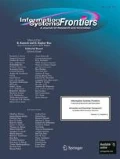In 2014, Information Systems Frontiers (ISF) completed 15 years of publication. Thanks to all the readers, reviewers, advisory and executive editors and guest editors, the journal has grown enormously in the past decade and a half. The year 2015 marks the first year from which six issues of ISF will be published each year. This move, from the current level of five issues per year to six, is a landmark achievement. This demonstrates the level of growth and maturity ISF has attained over the past 15 years and its establishment as a well-regarded first-tier academic journal.
ISF occupies a niche area among IS journals. It publishes cutting-edge research with a multidisciplinary focus, crossing numerous inter-disciplinary boundaries. ISF focuses on new advances and emerging trends in next generation information systems and technologies. It explores innovative responses to the challenges of doing business in an increasingly mobile and global marketplace. For example, the special issues of ISF published in Volume 16 (2014) ranged from Dynamic intelligence towards merging cloud and communication services, Advances in infrastructures and tools for multiagent systems, Information Reuse, Integration, and Reusable Systems and a special section in memory of Paul Gray (1930–2012) on the application of “futures research” to MIS. Such a wide range and variety of cutting-edge research areas have been the hallmark of every volume of ISF since its inception. While ISF was created with such a concept as its central theme, the resounding realization of this concept as demonstrated in these volumes would not have been possible without the numerous contributions of its editors, authors and readers.
The first issue of Volume 17 starts with an article by Nobel Prize winning economist Kenneth Arrow (2015) on “Microeconomics and operations research: Their interactions and differences”. The article is based on a Stanford Engineering Hero lecture which was delivered in March 2014. Professor Arrow’s lecture spans the interface between microeconomics and operations research and includes his reminiscences of Harold Hotelling, George Dantzig, and Tjalling Koopmans among others. The article is a wonderful “romp through history” and quite fascinating.
Following this article, this issue presents a set of articles that constitute a special issue on IS/IT success and failure, edited by an international team of guest editors - Yogesh Dwivedi and David Wastell from the UK, Helle Zinner Henriksen from Denmark and Rahul De from India. The articles in the special issue range from case studies of a large transformation project in the Netherlands, an information system for updating land records in Bangladesh, to public grievance redress system in India. In addition, the special issue includes a multi-authored perspective oriented paper on IS failures and successes.
Subsequently, this issue presents a set of regular papers on antecedents of cognitive trust (Lee et al. 2015), structural models of online auctions (Scott et al. 2015) and profiling of internet banking users (Mansingh et al. 2015). This issue closes with a piece by Chris Bang (2015) that analyses the various articles that have been published in ISF over the years and categorizes the different topics into clusters.
Finally, we would like to take this opportunity to once again thank the various referees who have spent a great deal of time and effort in reviewing, and have helped to maintain high standards of quality in ISF publications. Last but not least, we wish to extend our appreciation of the Springer team for their support over the years.
References
Arrow, K. (2015). Microeconomics and operations research: their interactions and differences. Information Systems Frontiers, 17(1). doi:10.1007/s10796-014-9539-9.
Bang, C. C. (2015). Information systems frontiers: keyword analysis and classification. Information Systems Frontiers, 17(1). doi:10.1007/s10796-014-9544-z.
Lee, J., Lee, J.-N., & Tan, B. C. Y. (2015). Antecedents of cognitive trust and affective distrust and their mediating roles in building customer loyalty. Information Systems Frontiers, 17(1). doi:10.1007/s10796-012-9392-7.
Mansingh, G., Rao, L., Osei-Bryson, K.-M., & Mills, A. (2015). Profiling internet banking users: a knowledge discovery in data mining process model based approach. Information Systems Frontiers, 17(1). doi:10.1007/s10796-012-9397-2.
Scott, J. E., Gregg, D. G., & Choi, J. H. (2015). Lemon complaints: when online auctions go sour. Information Systems Frontiers, 17(1). doi:10.1007/s10796-012-9394-5.
Author information
Authors and Affiliations
Corresponding author
Rights and permissions
About this article
Cite this article
Ramesh, R., Rao, H.R. Foreword: Information Systems Frontiers. Inf Syst Front 17, 1–2 (2015). https://doi.org/10.1007/s10796-015-9545-6
Published:
Issue Date:
DOI: https://doi.org/10.1007/s10796-015-9545-6

